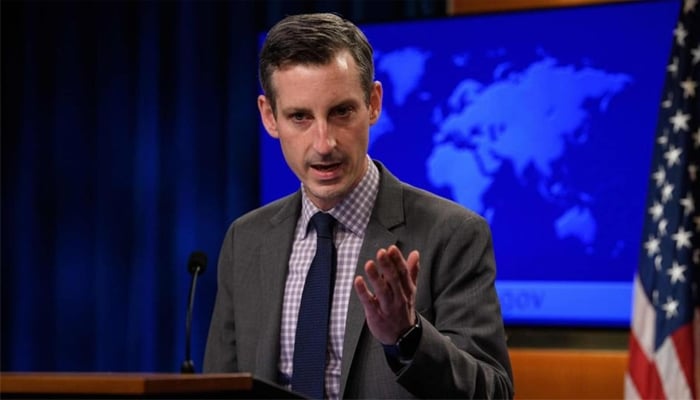Taliban interim govt not reflective of what we had hoped to see: US
State Dept spokesperson Ned Price says US and international community will continue to "hold Taliban accountable for commitments'
WASHINGTON: US State Department spokesperson Ned Price Thursday said the interim Taliban government does not reflect what the international community and the United States hoped to see.
The Taliban had announced the first members of a new "acting" government earlier this week, after sweeping into full power with the takeover of Kabul, on August 15.
The new cabinet will be led by Mullah Mohammad Hassan Akhund, one of the movement's founders, who is on a UN blacklist.
Price informed the reporters: "We have spoken about our reaction to the initial caretaker government. You have heard us say that the lack of inclusivity, the track records, the backgrounds of some of the individuals involved, are a cause for concern."
"It certainly does not reflect what the international community and what, as a part of that, the United States hoped to see," Price added.
He said that the US noted that this is an initial caretaker government. "We note that some of these positions remain unfulfilled. So what will be important to us is not only the composition of any future government of Afghanistan...again, we will look to see to it that it is inclusive, to see to it that it is representative of the people that the Taliban purport to represent," the spokesperson said.
Price emphasised that the US and international community will continue to "hold the Taliban accountable for its public and private commitments" made to the US and many of its close partners.
Price spoke about a ministerial meeting hosted by US Secretary of State Antony Blinken a day earlier along with Foreign Minister Heiko Maas of Germany.
World powers have told the Taliban the key to peace and development is an inclusive government that would back up its pledges of a more conciliatory approach, upholding human rights, after a previous 1996-2001 period in power marked by bloody vendettas and oppression of women.
During his news conference, Price said that several elements of consensus emerged during the meeting over the Taliban and that there were key questions that many of the participants posed: "Will the Taliban uphold their commitments to freedom of travel and safe passage — in the case of the United States for Americans, but also for third-country nationals, for our Afghan partners? Will they live up to their counterterrorism commitments?" Price raised some of the questions.
Price said the questions remain unanswered. "We will together be able to answer those questions with our allies and partners as we start to see how the Taliban is going to purport to govern, how it will treat its people, how it will treat our people, how it will confront threats not only to the Taliban but threats to us as well," he said.
-
Poll reveals majority of Americans' views on Bad Bunny
-
Man convicted after DNA links him to 20-year-old rape case
-
California cop accused of using bogus 911 calls to reach ex-partner
-
'Elderly' nanny arrested by ICE outside employer's home, freed after judge's order
-
key details from Germany's multimillion-euro heist revealed
-
Search for Savannah Guthrie’s abducted mom enters unthinkable phase
-
Barack Obama addresses UFO mystery: Aliens are ‘real’ but debunks Area 51 conspiracy theories
-
Rosie O’Donnell secretly returned to US to test safety















